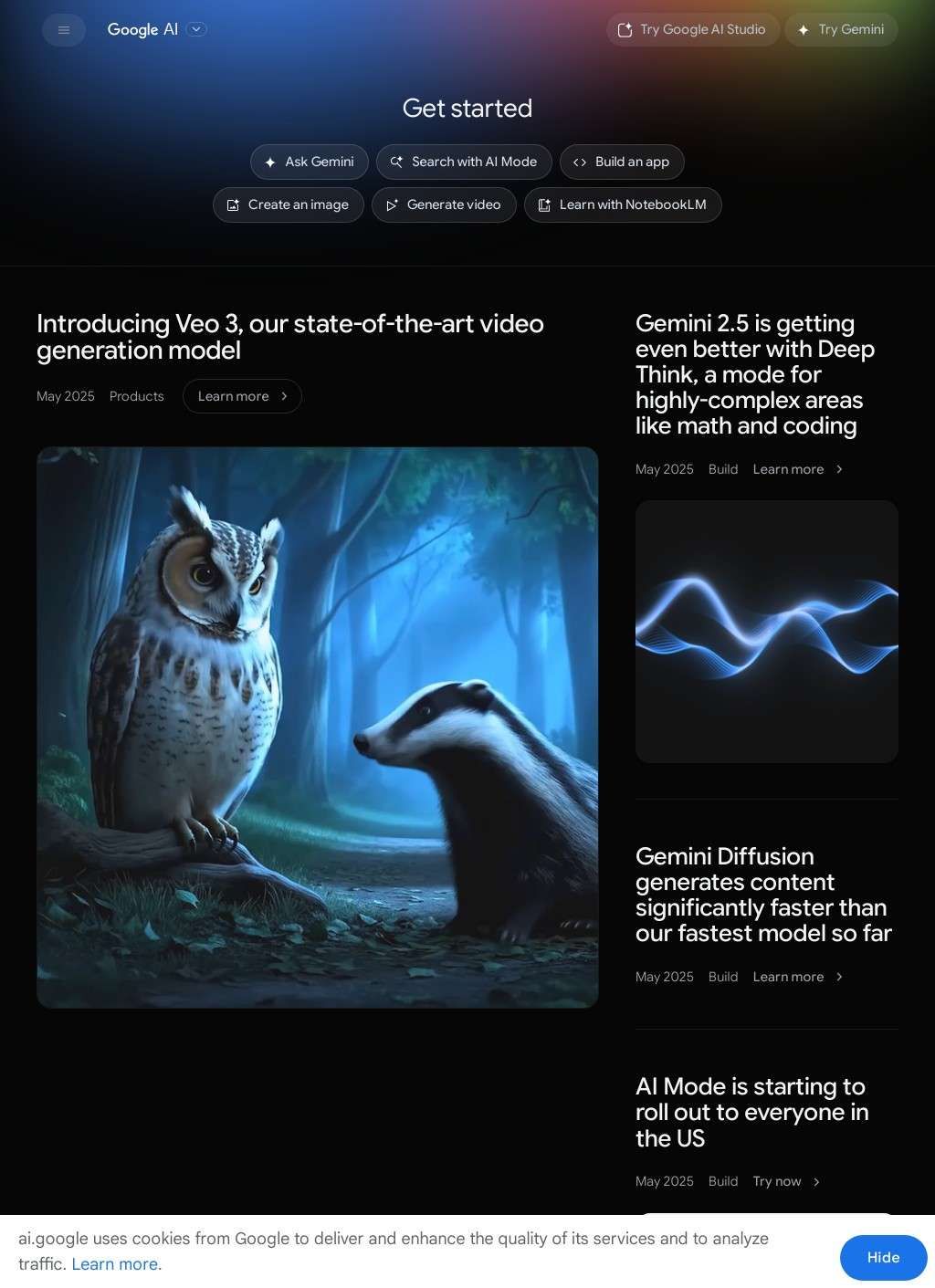Google AI for Developers represents Google's unified approach to making artificial intelligence accessible and practical for software developers across all experience levels. The platform brings together Google's extensive AI research and infrastructure into a cohesive development environment that spans everything from experimental tools to production-ready services. Unlike platforms that focus on a single model or use case, Google's offering provides a complete ecosystem where developers can experiment with cutting-edge AI capabilities, build applications using proven tools, and scale solutions using Google's cloud infrastructure. The platform reflects Google's position as both an AI research leader and a practical technology provider.
The cornerstone of the platform is the Gemini family of models, Google's most advanced AI systems that handle text, images, video, and audio in a single unified interface. Gemini models come in different sizes optimized for various use cases - from Gemini Nano for on-device applications to Gemini Pro for complex reasoning tasks. Google AI Studio provides an intuitive interface for experimenting with these models through freeform prompts, structured conversations, and chat interfaces. Developers can test ideas quickly, export working code, and integrate successful experiments into their applications without needing deep machine learning knowledge.
What sets Google's platform apart is its integration with the broader Google ecosystem and focus on multimodal AI capabilities. Developers can combine Gemini models with Google Search for real-time information retrieval, integrate with Google Cloud services for enterprise-grade infrastructure, and leverage Google's extensive data processing capabilities. The platform also includes specialized tools like NotebookLM for document analysis, Imagen for image generation, and various experimental features that showcase emerging AI capabilities. This comprehensive approach means developers can build sophisticated applications without managing multiple vendor relationships.
The platform serves different types of developers through carefully designed entry points and progression paths. Newcomers can start with Google AI Studio's visual interface to understand how AI models work and experiment with different prompt strategies. Web developers can use the Gemini API with JavaScript and popular frameworks, while mobile developers get access to on-device AI capabilities through TensorFlow Lite and MediaPipe. Data scientists and machine learning engineers can work with more advanced tools like TensorFlow, Vertex AI, and custom model training capabilities. This layered approach ensures that developers can engage at their current skill level while having room to grow.
Google's commitment to open-source development shows throughout the platform, with many tools available for free use and modification. TensorFlow remains one of the most popular machine learning frameworks globally, providing everything from beginner-friendly APIs to advanced research capabilities. MediaPipe offers pre-built solutions for common computer vision and audio processing tasks, while TensorFlow.js enables machine learning directly in web browsers. The platform also includes extensive model libraries, pre-trained components, and community-contributed resources that accelerate development timelines.
The platform addresses practical deployment concerns that developers face when moving from prototypes to production applications. Google Cloud integration provides enterprise-grade security, compliance certifications, and global infrastructure for scaling AI applications. The platform includes monitoring and evaluation tools that help developers track model performance, identify potential issues, and maintain quality over time. Cost management features help developers understand and control expenses as their applications grow, while rate limiting and quota management prevent unexpected charges.
Educational resources and community support play a significant role in the platform's value proposition. Google provides comprehensive documentation, video tutorials, and hands-on courses through platforms like Coursera and Google's own learning materials. The company regularly hosts developer events, publishes research findings, and maintains active community forums where developers share experiences and solutions. Google's AI principles and responsible AI practices are integrated throughout the platform, helping developers understand not just how to build AI applications, but how to build them responsibly.
For developers seeking hands-on support and professional development opportunities, Google offers multiple engagement channels including developer programs, certification paths, and partnership opportunities. The Google Developer Program provides early access to new features, credits for Google Cloud services, and networking opportunities with other developers. Google also maintains relationships with educational institutions and provides resources for learning AI development in academic settings. Technical support ranges from community forums and documentation to direct support for enterprise customers, ensuring that developers can get help when they encounter challenges or need guidance on complex implementations.
